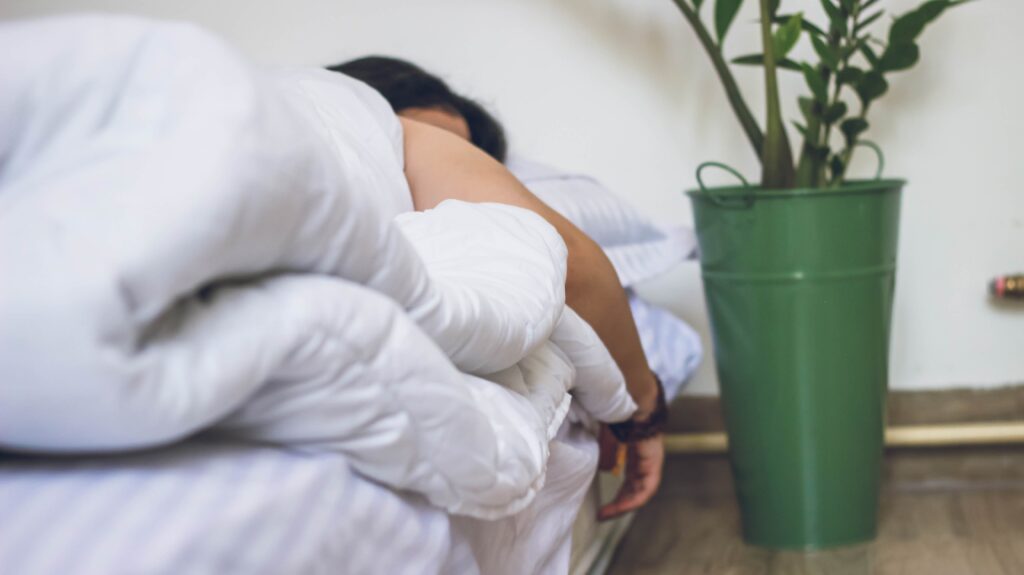We spend a third of our lives asleep yet many of us find it hard to sustain sleep for a full, uninterrupted eight hours. For something that should be an easy, natural function, sleep can be extraordinarily complex.
What happens when you sleep?
Sleep is a necessary stage in a 24-hour period to enable the nervous system to function properly, and the brain to process information. During sleep, your metabolism slows down, conserving important energy. It gets rid of toxic waste and dead cells, restores energy, and releases important hormones and proteins for metabolic repair.
The recommended sleep quota for adults is 7–9 hours, although 36% of adults in the UK struggle to get enough sleep at least once per week. Sleep deprivation starts young: during adolescence teenagers sleep an average of 7 hours per night, despite requiring 9–10 hours.
Sleep deprivation leads to poor mood, impulsive behaviour, slower cognitive ability and focus, poorer performance at work and school. In fact, sleep deprivation affects every system in the body, including the inflammatory response and susceptibility to infections and illness.
So, what are some of the common causes of poor sleep, and what can you do to improve your chances of getting a good night’s sleep?

Disrupted circadian rhythms
Research suggests that circadian rhythms regulated by the hypothalamus in the brain have a strong influence on sleep.
It is important to train these rhythms by getting enough light during daytime hours, particularly in the morning. If you can get out and exercise early in the day, then this combines another important factor: sunlight, fresh air, and movement.
In a study in Taiwan, researchers asked participants with dementia to sit for one hour each morning in a room with bright ambient lighting. They recorded a staggering decrease of 23% fewer nighttime awakenings in their patients. [1]
Use of screens and devices that emit blue light
Using your phone or tablet late at night can block the release of melatonin from the pineal gland and stimulate the production of ‘excitatory’ stress hormones.
Install a blue light filter on your device, such as F.Lux or Twilight. Treat yourself to a good book rather than social media 2 hours before bedtime, and read it in a dim, cool room.

Eating too much or eating too little
Eating a large meal before bed can stimulate the release of insulin which interferes with the natural circadian rhythms. However, eating too little can stimulate stress hormones and cause wakefulness.
Strike the right balance by eating your evening meal no later than 3 hours before bed, and if you’re still hungry, eat a small nutrient-dense snack beforehand.
Worry and anxiety
Stress remains one of the biggest causes of sleep disturbances. If your worries tend to mount up at night this can cause a surge of cortisol and adrenalin and put paid to relaxation.
If you’re prone to anxiety, try reading At Last a Life and Beyond by Paul David. The method doesn’t involve any elaborate rituals or exercises and is remarkably simple and effective.
You can also try this mindful body scan exercise while you are in bed:
- When you notice yourself beginning to worry, draw your attention to your body and what you can feel and touch. Starting from the top of your head, guide your awareness down your body. Your attention will repeatedly wander—this is normal—all you need to do is gently guide it back to your physical body. As the technique repeatedly brings your attention away from your thoughts, you should start to drift off.
Address your magnesium status, which partly governs how ‘excitable’ your nervous system is. Use transdermal sources of magnesium such as Epsom salt baths and magnesium gels and lotions to top up cellular levels through the skin.

Herbs for sleep
Finally, there are plenty of natural herbs to try if you need help falling asleep:
- Valerian is a pungent, aromatic and slightly bitter herb with sedative and anti-anxiety properties. It contains high levels of valerenic acid which increases levels of a relaxing neurotransmitter called GABA in the brain.
- Hops is traditionally used to brew beer, but it’s also a good herb to pair with valerian as they reinforce each other’s sedative effects. It may also reduce feelings of irritability and quieten the mind.
- A member of the mint family, skullcap is used for stress, anxiety, pain and sleep. It is a traditional nervine tonic once used by Native American tribes who taught European settlers how to prepare it.
- Lavender is a fragrant, aromatic herb traditionally used for sleep, pain, and to ease tension.

References
[1] (https://www.sleepfoundation.org/sleep-news/bright-morning-light-improves-sleep-disturbances-in-people-with-dementia)








